Key takeaways:
- Networking is about building authentic relationships that can lead to unexpected collaborations and opportunities.
- Active listening and genuine engagement can transform discussions into valuable connections and future partnerships.
- Preparation and targeted questions enhance the quality of interactions at expos, facilitating deeper conversations.
- Follow-up after events is crucial for nurturing connections and turning initial meetings into lasting professional relationships.
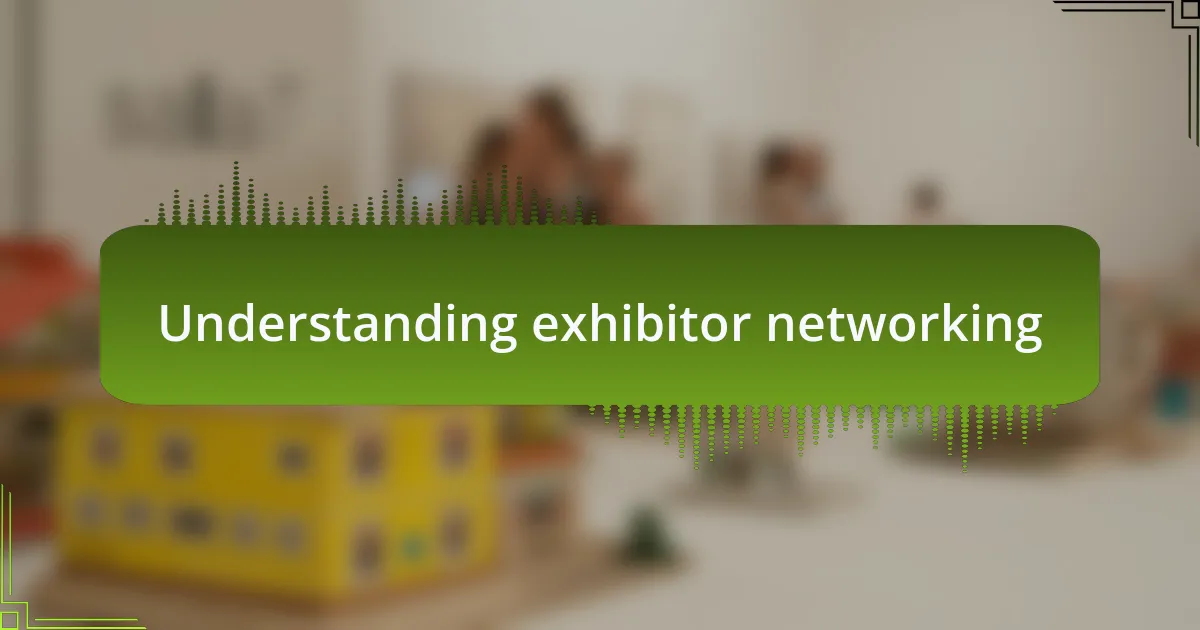
Understanding exhibitor networking
Exhibitor networking is all about building meaningful relationships that can enhance future collaborations and business opportunities. I remember my first exhibition; I was nervous as I approached other exhibitors, but once I initiated conversations, I discovered shared interests and potential partnerships that I had never considered before. Isn’t it fascinating how a simple interaction can lead to unexpected opportunities?
Networking isn’t just about exchanging business cards; it’s about genuine connection. For instance, during one event, I struck up a conversation with a fellow exhibitor who was initially just a stranger. This interaction evolved into a fruitful partnership that lasted for years. Reflecting on that experience, it’s clear that taking the time to understand someone’s perspective can uncover pathways that benefit both parties.
Understanding the nuances of exhibitor networking also means recognizing the importance of active listening. I often find that by really tuning into what others are saying, I can identify common challenges and brainstorm solutions together. How often do we miss valuable insights when we’re too focused on making our pitch? Engaging in authentic dialogue, I believe, transforms a typical business exchange into a collaborative journey that can yield remarkable results.
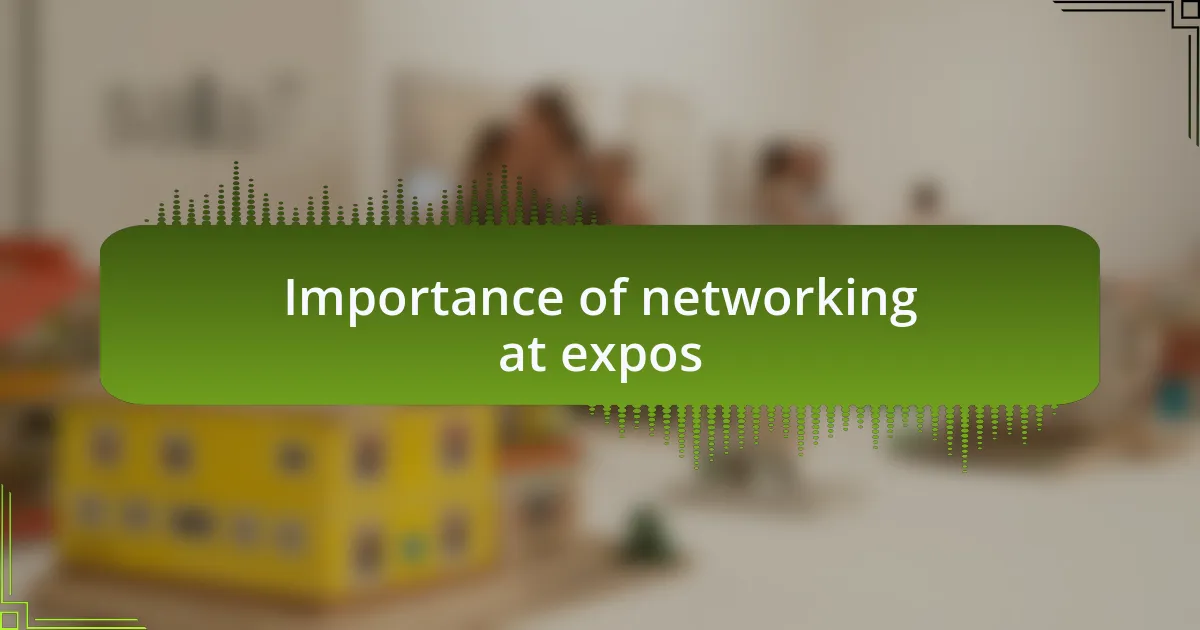
Importance of networking at expos
Networking at expos is often the key that unlocks new doors. I vividly recall an instance where I found myself in a corner booth, surrounded by competitors. Instead of avoiding them, I chose to reach out. That simple decision led to an enlightening conversation about market trends, which ultimately inspired me to innovate my own strategies. Isn’t it intriguing how competition can motivate collaboration?
The relationships forged during these events often extend beyond the expo itself. I once met a contact who later became a mentor, sharing invaluable advice that transformed my approach to business. When I think back on that encounter, it strikes me how a moment of courage to connect can shape not only our networks but also our careers. Isn’t it remarkable how those initial interactions cultivate ongoing growth and development?
Additionally, networking fosters a sense of community within the industry. At one memorable expo, I was pleasantly surprised by the warmth of the interactions I had, even with those I hadn’t met before. The mutual support and encouragement among exhibitors reinforced my belief that we are all part of a larger ecosystem working towards common goals. How often do we forget that these connections can help us weather challenges together?
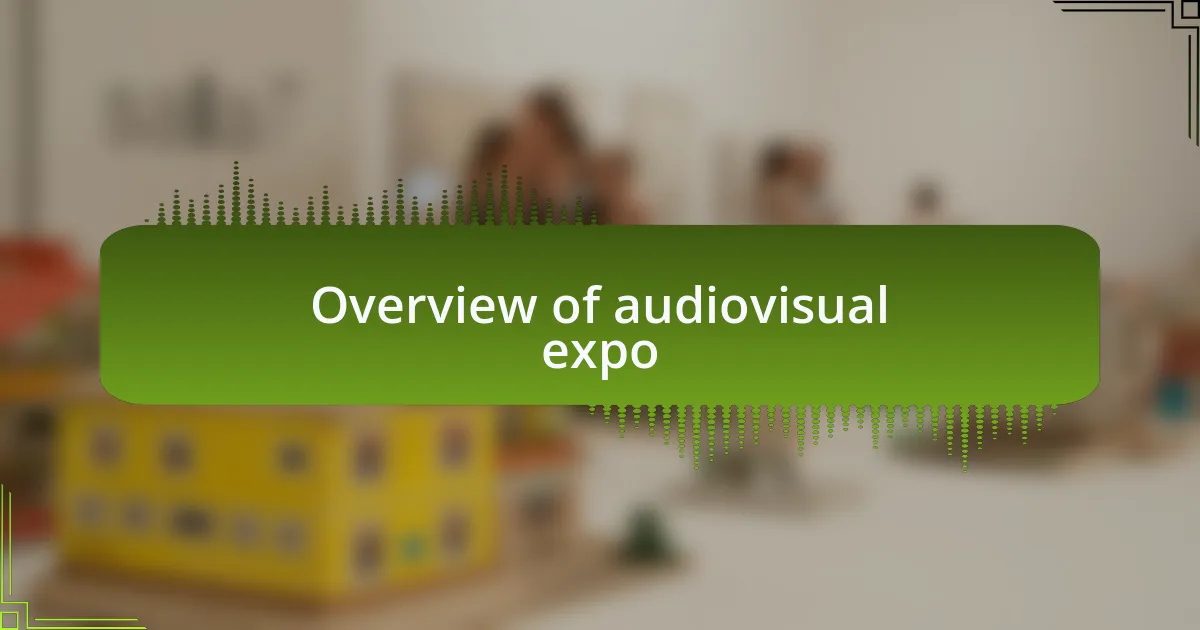
Overview of audiovisual expo
The audiovisual expo stands as a vibrant hub for industry professionals, showcasing the latest in technology, creativity, and innovation. I remember walking through the aisles, each booth offering a unique glimpse into groundbreaking technologies, from cutting-edge projectors to immersive sound systems. Seeing these advancements in person left me inspired and eager to explore how they could enhance my projects.
In my experience, the energy at these expos is palpable. I once found myself in a workshop led by an industry pioneer, whose passion for sound design was infectious. Engaging with such experts not only broadened my understanding but also spurred my own creative thinking. Can you feel the excitement in the air when you’re surrounded by people who share your enthusiasm?
The diversity of exhibitors at the audiovisual expo is truly remarkable. I often connect with professionals from various backgrounds, each bringing their own unique perspective to the table. It’s fascinating how these interactions can lead to unexpected collaborations. Have you ever wondered how a simple conversation could spark an idea that transforms your approach to a project? That’s the magic of these expos; they create fertile ground for inspiration and innovation.
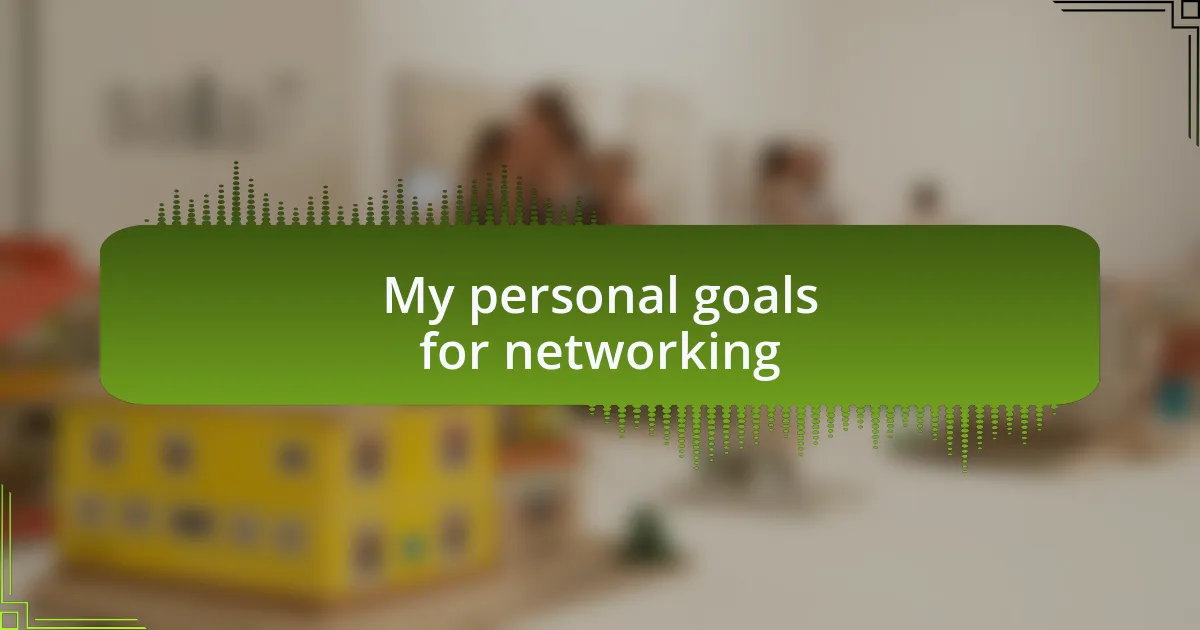
My personal goals for networking
When I attend networking events, my primary goal is to build authentic relationships with industry professionals. I recall a memorable encounter with a sound engineer who shared his journey into the world of audio mixing. It was enlightening, and I could sense how much he valued connection over mere transactions. Have you ever experienced a moment where a genuine conversation led to a breakthrough idea? Those are the conversations I seek out.
Another personal goal is to expand my knowledge base by tapping into the expertise of others. I aim to learn from various exhibitors, absorbing insights that can directly benefit my work. During one expo, I struck up a dialogue with a lighting designer, who shared his unique approach to creating mood through lighting. His practical tips sparked new ideas for my projects. Isn’t it fascinating how a single discussion can reshape your perspective?
Ultimately, I strive to leave with actionable connections that can lead to future collaborations. I remember following up with someone I met at an expo who had similar interests in immersive experiences. As we exchanged ideas over coffee later, I realized how powerful intention-driven networking could be. Don’t you think it’s essential to find people who not only inspire us but also share a vision for collaboration? That’s what fuels my passion for networking.
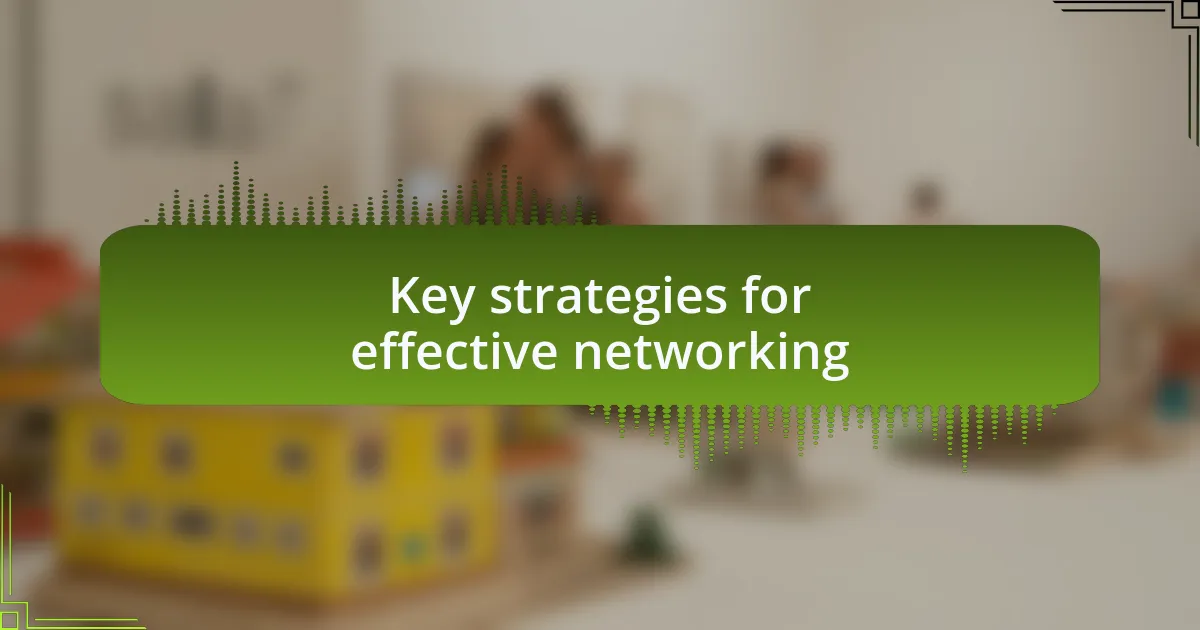
Key strategies for effective networking
One of the most effective strategies I’ve adopted is to prepare targeted questions ahead of time. When I approached a booth last year, I didn’t just ask about their products; I inquired about the challenges they faced in the industry. This approach not only set the tone for a meaningful conversation but also allowed me to dig deeper into their experiences. Have you ever noticed how a well-thought-out question can pull someone right into sharing their thoughts?
Another key technique is actively listening. During an expo, I engaged with a panelist who spoke passionately about sustainability in audiovisual production. While he talked, I didn’t just wait for my turn to speak; I absorbed his insights, nodding and sharing my thoughts when appropriate. This genuine engagement led to a follow-up invitation to collaborate on a project he was considering. Isn’t it remarkable how simply listening can create opportunities?
Lastly, I believe in following up promptly after the event. A few weeks after meeting a fellow exhibitor, I sent a personalized email reflecting on our discussions and suggesting further ideas we could explore together. This small gesture turned into an ongoing mentorship that continues to shape my career. Have you experienced the lasting impact of a simple follow-up? It’s often the bridge between a single meeting and a lasting professional relationship.
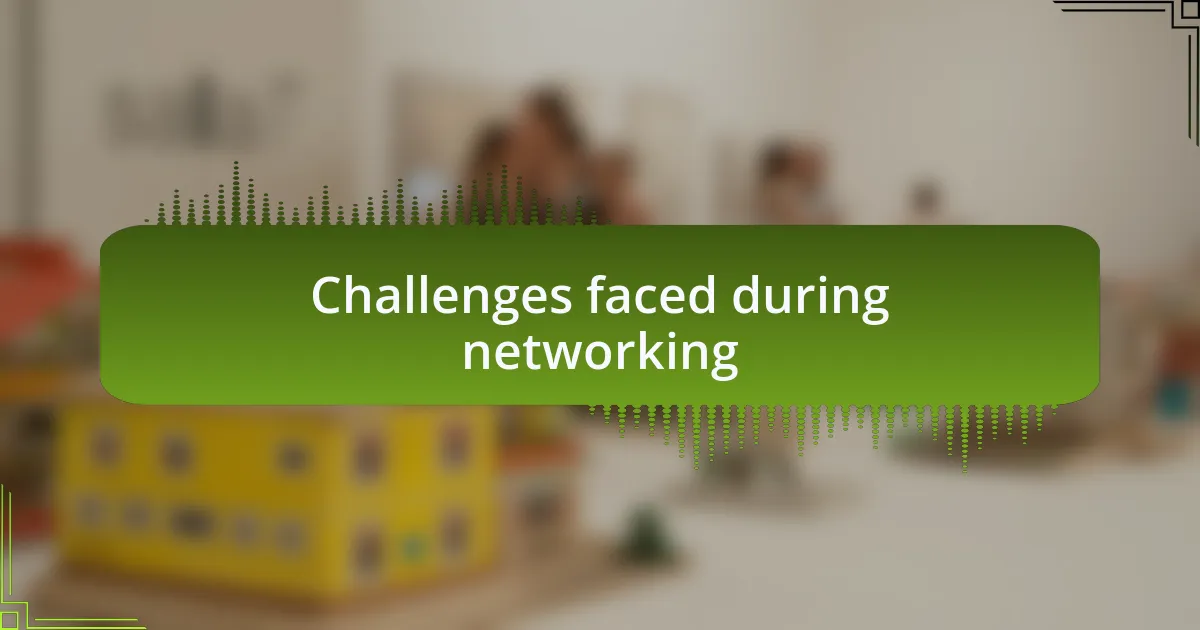
Challenges faced during networking
Engaging with new contacts at expos can be challenging, particularly when trying to break through the initial barriers of hesitation and shyness. I remember feeling a knot in my stomach before approaching a well-known industry leader. The pressure to make a good first impression can sometimes overshadow the natural flow of conversation. Have you ever felt that sense of anxiety when trying to introduce yourself to someone significant? It’s not uncommon.
Another obstacle I’ve encountered is the sheer volume of people and noise at an event. It can feel overwhelming when you’re striving to make meaningful connections amidst the hustle and bustle. During one event, I attempted to connect with a potential partner, but the background chatter made it difficult to hear each other. It was like shouting into the wind—frustrating and ineffective. How do you navigate those distracting environments? I find that seeking quieter corners can lead to deeper discussions, but it requires a proactive mindset.
Time constraints are another significant challenge. With a packed schedule of workshops, panels, and meetings, it’s easy to lose track of potential connections. I vividly recall rushing between sessions and regretting that I didn’t dedicate enough time to explore each conversation fully. In a time-pressed setting, how do you prioritize relationships? For me, setting specific networking goals for each day has proven invaluable. It helps me focus my efforts and ensures that I leave each event with meaningful connections rather than just a stack of business cards.

Lessons learned from my experience
One key lesson I learned is the importance of preparation before attending any networking event. I remember spending one late night researching key speakers and exhibitors, only to find that it gave me the confidence to approach them the next day. Have you ever walked into a venue feeling unprepared? It’s such a game changer to arm yourself with knowledge—whether it’s about trends in the industry or specific individuals I wanted to connect with.
Another insight I gained is the value of follow-up after the initial interaction. Immediately after an event, I felt the adrenaline of meeting so many new people, but I quickly realized that those connections needed nurturing. One time, I followed up with a contact a week later, referencing our conversation, and that small gesture morphed into a partnership that significantly impacted my project. How often do we let meaningful connections fade away because we don’t take that next step? In my experience, a simple email can keep the momentum alive.
Lastly, I discovered that networking isn’t just about exchanging business cards; it’s about building relationships. At one expo, I ended up having a casual chat with someone over coffee that turned into a brainstorming session on a collaborative project. I didn’t expect that conversation to lead to something productive, but it showed me the power of genuine connections. Have you taken the time to build rapport with your contacts? I’ve found that investing emotional energy into these interactions fosters a sense of trust and opens doors for future opportunities.